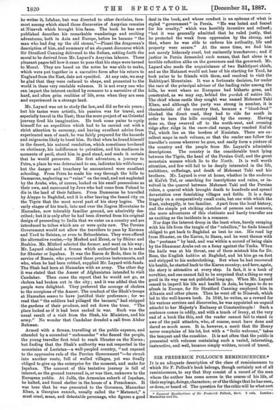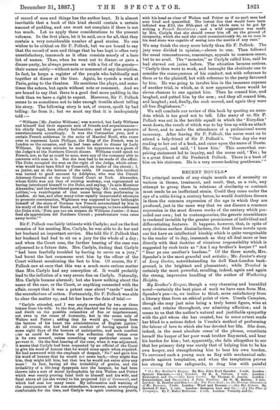SIR FREDERICK POLLOCK'S REMINISCENCES.* Ix is an adequate description of
the class of reminiscences to which Sir F. Pollock's book belongs, though certainly not of all reminiscences, to say that they consist of a record of the men whom the author has come across in the course of his life, of their sayings,doings, characters ; or of the things that he has seen, or done, or heard of. The question for the critic will be what sort
• Personal Recollections of Sir Frederick Pollock, Bart, 2 vole. London e Macmillan sad Co. of record of men and things has the author kept. It is almost inevitable that a book of this kind should contain a certain
amount of padding, and one must not complain if there is not too mach. Let us apply these considerations to the present volumes. In the first place, let it be said, once for all, that they contain a very considerable number of good stories. No one wishes to be critical on Sir F. Pollock, but we are bound to say that the record of men and things that he has kept is often very unsatisfactory, inasmuch as it often consists merely of a bare list of names. Thus, when he went out to dinner, or gave a dinner-party, he always presents us with a list of the guests— their names solely—without note or comment of any description. In fact, he keeps a register of the people who habitually met together at dinner at the time. Again, he spends a week at Paris, going to the theatres. He mentions the plays, and some- times the actors, but again without note or comment. And we are bound to say that there is a good deal more padding in the book than we have a right to expect. Moreover, Sir F. Pollock seems to us sometimes not to take enough trouble about telling
his story. The following story is not, of course, spoilt by bad telling : far from it ; bat we most say that it is inadequately told:— "Williams [Mr. Justice Williams] was married, but Lady Williams and himself had their separate sate of friends and acquaintances— his chiefly legal, hers chiefly fashionable; and they gave separate entertainments accordingly. It was the Coronation year, and a certain French nobleman in the suite of Marshal Book, who came over to represent Lords Philippe, the King of the French, was in London on the occasion, and he had been asked to dinner by Lady Williams. By some mistake he made his appearance as a guest of the Judge's at the Northern Circuit dinner. Williams could speak no French, nor, so far as could be sees, were any of the company able to converse with ease in it. But the best had to be made of the affair. The Duke occupied the seat on the right of the Judge, which other- wise would have been filled by Cresswell, as leader of the circuit ; I, as junior, sat at the bottom of the table. Of course, this incident was turned to good account by Adolphus, who was the Circuit Attorney-General at the next Grand Court at York. Alexander, whose foible was not that of retiring modesty, was represented as having introduced himself to the Duke, and Baying, ' Je suis Monsieur Alexandre,' and the bewildered guest as replying, 'Ah ! oni, ventriloque celehre,'—a ventriloquist of that name being then performing in London. At last, and after many other equally nnauccesaftil attempts to promote conversation, Wightman was supposed to have bethought himself of the store of Norman law French accumulated by him in his study of the old Year Books, and, taking courage, to have addressed
the Duke with, 'Note qae ceo est meaeon de Williams Justice dons feed ale apprentices del Northern Circuit ; peradventure vous estes nemy invite.'"
Sir F. Pollock was fairly intimate with Carlyle; and on the first occasion of his meeting Mrs. Carlyle, he was able to do her and her husband an important service. She told Sir F. Pollock that her husband had had to sit on a jury for the whole of a day; and when the Court rose, the farther bearing of the case was adjourned to a future date. Mrs. Carlyle, finding that Carlyle " had been fearfully troubled by having to serve on a jury," had burnt the last summons sent him by the officer of the Court without mentioning the fact to him. Of course, Sir F. Pollock saw at once that this was a much more serious matter than Mrs. Carlyle had any conception of. It would probably lead to the infliction of a very severe fine on Carlyle. Naturally, Mrs. Carlyle became alarmed; but she knew nothing about the name of the case, or the Court, or anything connected with the affair, except that it was a patent case about " cards " used in the manufacture of cotton. Fortunately, Sir F. Pollock was able to clear the matter up, and let her know the data of trial :— "Carlyle attended, and I was amply rewarded by two or three letters from his wife. In the first, she thanked me for my assistance, and dwelt on the possible calamities of fine or imprisonment, not even in the canoe of humanity, but in the came only of Walton and Potter ; adding that he would go, ' cursing from the bottom of his heart the administration of English justice.' At all events, she had had the comfort of having spared him some eight days of the horrors of anticipation, and such comfort Liao as could be drawn from the reflection that virtue ever is its own reward, unless something very particular occurs to prevent it. On the first bearing of the case, when it was adjourned, it seems that Carlyle bad been requested by an official of the Court to give his word of honour that be would come again when required. He had answered with the emphasis of despair, ' No!' and gave him his word of honour that he would not come back,—they might fine him, they might kill him, but that box he would not enter alive any more ! In fact, having all the irritability of genius, and the irritability of a life-long dyspepsia into the bargain, he had been thrown into a sort of moral hydrophobia by this Walton and Potter which was nearly proving fatal both to himself and his wife, and fatal above all (as she wrote) to his projected Life of Cromwell, and which had cost her many tears. My information and warning of the consequences of his non-attendance, however, made everything comfortable for the time, and Carlyle was again correcting proofs, with his head as clear of Walton and Potter as if no such men bad ever lived and quarrelled. The lowest fine that would have been inflicted was £10, the fifth-part of the whole sum to be got by writing a French Revolution ; and a wild suggestion was made by Mrs. Carlyle that she should swear him off on the ground of incapacity, which she said she could conscientiously do, ae no man in his mad state was capable of seeing into the merits of any ease."
We may finish the story more briefly than Sir F. Pollock. The jury were divided in opinion,—eleven to one. Then followed the usual remonstrances, reasonings, appeals to common-sense, but to no avail. The "monster," as Carlyle called him, said he had starved out jades before. The situation became serious. " Carlyle then went to work, and besought the obstinate one to consider the consequences of his conduct, not with reference to them or to the plaintiff, but with reference to the party favoured by him. He was going to involve him in the immense expense of another trial, in which, as it now appeared, there would be eleven chances to one against him. Then be coaxed him, and laughed, and patted him by the arm ; and they all coaxed him, and laughed; and, finally, the rock.moved, and again they were all free Englishmen."
We will conclude our review of this book by quoting an anec- dote which is too good not to tell. Like many of us, Sir F. Pollock was out in the terrible squall in which the Eurydice' went down, the result of which was to lay him up with an attack of fever, and to make the attendance of a professional nurse necessary. After leaving Sir F. Pollock, the nurse went on to attend a lady-friend of Sir F. Pollock's. "One day she was reading to her out of a book, and came upon the name of Dante. She stopped, and said, ' I know him.' This somewhat sur- prising statement led to inquiry, and the nurse said, ' Yes ; he is a great friend of Sir Frederick Pollock. There is a bust of him on his staircase. He is a very severe-looking gentleman.' "







































 Previous page
Previous page